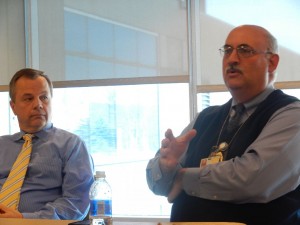Hudson Valley hosts forum on police brutality

A public forum discussing the recent incident involving the Troy Police at Kokopellis took place on Friday, Mar. 7 at Hudson Valley.
The case, still under investigation, went viral when footage of Roshawon Donley’s encounter with law enforcement on the scene displayed what members of Troy African American Pastoral Alliance describe as “police brutality.”
Louis Coplin, director of Student Life, was the moderator of the public forum he titled, “Getting Home Safe: Civility and Conduct after Midnight.”
The event was sponsored by the Black and Latino Student Union and the Student Activities Office.
“These are the programs we believe are as important as what you learn in the classroom,” said Coplin.
Panelists at the open discussion included Cylon George, campus ministry chaplain, Capt. Terry Buchanan of the Internal Affairs Bureau at the Troy Police Dept. and Fred Alberti, director of Public Safety and former Albany police officer of 20 years.
The discussion followed the controversial events that took at place Kokopellis night club in January.
11 days after the incident, pastor Willie Bacote formed a march against police brutality with nearly 100 people moving down 5th Ave. in Downtown Troy to Christ Church United Methodist. Multiple discussions and public hearings have also been held.
Terry Buchanan claims Roshawon Donley was struck three times in the back of the leg and once in the eye while resisting arrest and people are “exploiting what didn’t happen to raise their social status.”
“There were no injuries that occurred from this nightstick. Absolutely none,” said Buchanan.
“There were 200 of them and eight of us,” Buchanan said. “Many of the officers could’ve been killed that night. It’s very unlikely any individuals there would’ve been killed by the police.”
“We need to meet force with force that is used against us,” Alberti said. “You hope [as a police officer] it never gets to this level. That’s the challenge.”
Louis Belman, accounting major, refuted the condition of those reportedly assaulted by Troy police.
“We saw it all,” said Belman. “Troy police are starting to get a really bad reputation because of their actions. [Troy Police] do not come up to the people without judgement. Being above the law is no excuse.”
Denying unnecessary measures taken at Kokopellis, Buchanan believes the video looked worse than it really was, stating that, “the optic of the swing of a nightstick can never look positive”
Some students defended the role of police during the raid.
“You can never underestimate the strength of one person,” said Alex Ferguson, CIS major.
“When people see cops, they know they have tasers, pepper spray, handcuffs, nightsticks and firearms but you have to put yourself in the cops shoes,” said Matt Dregos, criminal justice major. “They don’t know what any of these people are capable of.”
Many have noted the racial implications of the complaints against the Troy police department.
“Young black men are being caught in the crosshairs. It often ends with some type of beating,” said campus ministry chaplain Cylon George.
“It looks like the tip of the iceberg from a long history of minorities having experienced certain things,” said George. “What we’re seeing is the reaction from a long history of prejudice in this city.”
“If we could increase diversity within law enforcement that would cut down on a lot of problems that occur,” said Hamassad Islam, biological sciences major.
“There’s always two sides to the story. What permeates is the core fundamental values of a person [themself],” said Islam. “Once they get that badge, their true colors come out.”
Students and panelists shared ideas at the end of the forum on what could be done to prevent another incident like the one at Kokopellis.
“I want people to see police officers as people and step in their shoes,” said Buchanan.
“If there’s a threat you don’t want an officer to get shot, but if there’s not a threat, you don’t want somebody else to get shot or beaten,” said Miles Jarot, business major who has had three interactions with Troy police since moving to the Capitol Region from Oregon.
“When you’re in a bar surrounded by a bunch of black people bigger than you, you should put officers in that training situation,” said Jarot. “They’re not prepared for that. It’s everybody’s best interest that an officer reacts accurately to a situation.”
Buchanan hopes to someday alter policy academy training to prepare officers for “not only technical, but empathetic training as well.”
Buchanan suggested that officers should have prior experience in soup kitchens and homeless shelters as part of their basic training.
“Police officers should be part of the community in order to gain respect from the community,” said Islam.
Advice from the panelists included avoiding high risk situations. “The common denominator here is the abuse of alcohol,” said Alberti.
